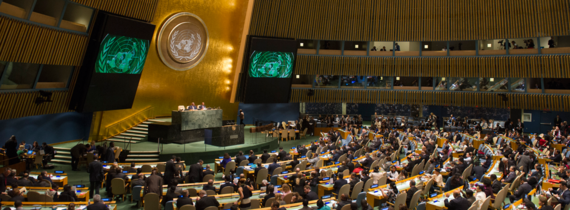As someone who has worked with, outside and inside the UN, and observed up-close the perfidies of both big powers and small powers, I had hopes that the election of the new UN Secretary-General for 2017-2022 would be different this time, with a measure of integrity and transparency.
It started off well early this year when the past President of the UN General Assembly Mogens Lykketof led efforts to democratize the process of electing the new Secretary-General with well-structured public hearings, allowing for candidates to articulate their vision and priorities and answer incisive questions from Member States and Civil Society. The public interviews reminded me of the US Senate hearings on senior appointments by the Administration.
One candidate, Antonio Guterres, impressed all with an unmatched mastering of the complex international social and security challenges facing us all; he also displayed exceptional understanding of the stifling UN bureaucratic machinery. He gained decisive support among at least 13 Security Council Members. Even the strongest advocates for a woman to be the next UN Secretary-General have surrendered to Antonio Guterres.
It is interesting to note that every time Portugal sought a seat in the UNSC for a two-year term as a non-permanent member it easily defeated some heavy weight competitors like Australia and Canada (1979-1980,1997-1998, 2011 - 2012).
Two thirds of the world community are small and mid-size countries who resent the bullying tactics of the major powers, who often bulldoze their views and agenda on the rest of us. Yet we all know that the larger powers with the most weaponry are also the ones most responsible for fueling conflicts by pouring arms and ammunition to their respective client groups.
Antonio Guterres comes from a small country that is friend of all and enemy of no one. He is a brilliant and honest political leader and eloquent communicator. As UN High Commissioner for Refugees, he managed a large and complex UN organization, and succeeded in streamlining its bloated bureaucracy saving tens of million dollars at HQ core costs.
As Prime Minister of Portugal he led numerous highly sensitive and successful EU Summits and EU relations with Asia, Africa and Latin America. He is not a conservative, a centrist or a socialist. A deeply spiritual person Guterres is above all a humanist, a humanitarian. It is clear to all that based on professional merits and human qualities, he is unquestionably the best candidate to replace outgoing Secretary-General Ban Ki-moon.
However, a process that began well with a very welcoming transparency is now running the risk of becoming a farce. Early in the process, Bulgaria, a former Soviet Union vassal State, and still trusted by Moscow, put forward Mrs. Irina Bukova, UNESCO Director-General, as its candidate for Secretary-General. As she fared very poorly in the straw polls, on Wednesday the Bulgarian government unceremoniously dumped her and pulled another Bulgarian, European Union Commissioner Kristalina Georgieva from the hat.
Supporters of Mrs. Georgieva argue that her stint as a World Bank official and EU Development Aid Commissioner qualify her for the top UN job but many question her grasp of global complex security challenges. Unlike Antonio Guterres, a democrat and statesman with a long and impressive track record in diplomacy, Mrs. Georgieva has a relatively sparse international experience.
By tossing her in the ring late in the game the Bulgarian government is acting in a manner that harms its new candidate and makes a mockery of the very hard won transparent process launched this year by the UN General Assembly.
This process, now in its final stages has yielded a formidable, experienced and proven global citizen. It is being undone by back-door dealings meant to serve the interests of one or two permanent members of the Security Council over the interests and judgement of close to 200 member nations, big, mid-sized and large.
The so-called "P5" should not have the illusion that the practices of a bygone era when they alone determined and imposed "solutions", including the new UN Secretary-General, can be sustained today. The selection process has gone beyond its earlier days, when the choice was the sole prerogative of the so-called big five.
UN General Assembly members are demanding a decisive say on the election of the new Secretary-General, and will no longer rubber stamp a decision made by the "P5" who may still think they are the Emperors. They may end up Emperors without people; and the people are all represented in the General Assembly.

